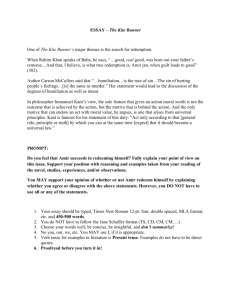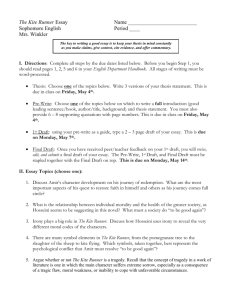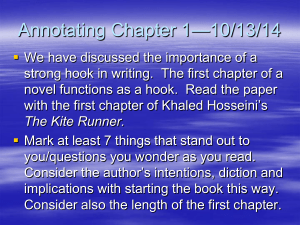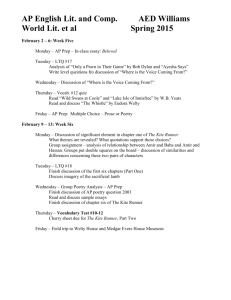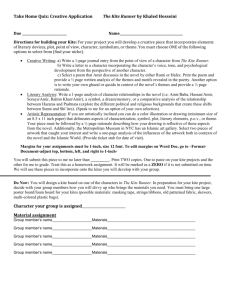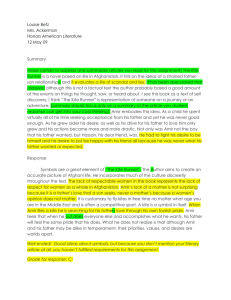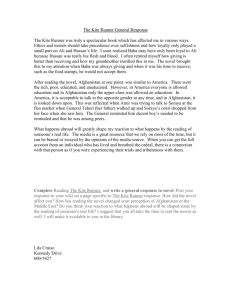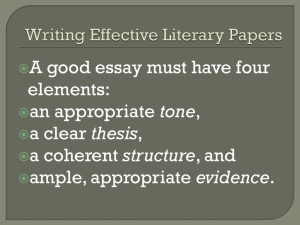Core III Organization
advertisement
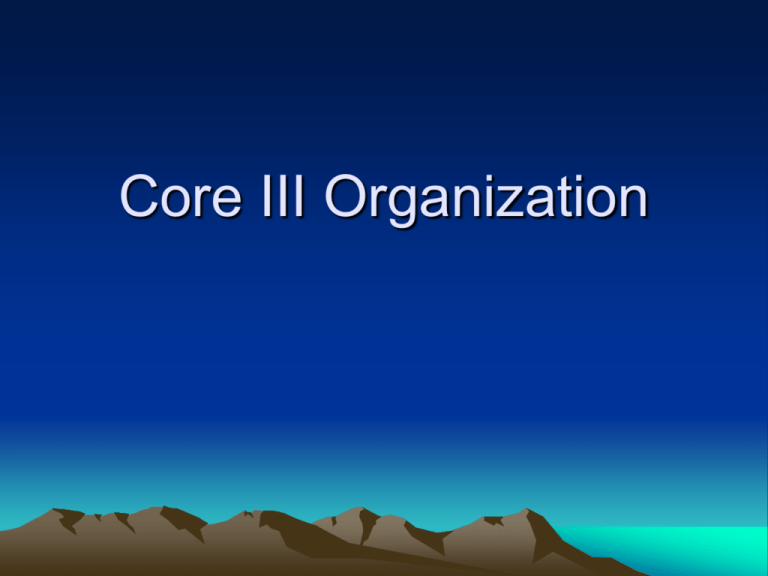
Core III Organization Before you write you should identify The purpose(s) and audience(s) for The Kite Runner • One major purpose of KR is _________. • Purpose: To show that redemption is possible. • Next, ask yourself if you think KR is effective in achieving this purpose for its audience; is somewhat effective; is effective in comparison to other novels that aim for this purpose; is very effective in one way but not as effective in another. • Possible audience for this thesis: People who have ever felt bad about things they have done in the past. • Then begin putting your thesis together: The author of Kite Runner aims to show how redemption is possible. I think he is very effective in doing this. • This is the beginning of your thesis statement, but you have a ways to go. Rough draft thesis: The author of Kite Runner aims to show how redemption is possible. I think he is very effective in doing this. • Next, brainstorm possible evidence for support of your thesis: • What plot points/events, characters, relationships (between people or people and places), aspects of setting support your thesis? • Try to combine these thoughts into a more complex sentence with an authoritative and persuasive tone: • Through Amir’s relationship to Hassan and, later, his relationship to Sohreb, Kite Runner shows how redemption is possible. • This thesis will probably still be revised and polished throughout the writing process; however, this is a great place to begin shaping. • Remember: Planning, Shaping, Drafting, Revising, Editing, Proofreading. QA pg. 14 • One more thing before you begin shaping: • Your thesis should determine your purpose. So if my thesis is • Through Amir’s relationship to Hassan and, later, his relationship to Sohreb, Kite Runner shows how redemption is possible. • Who might be interesting in reading my evaluation? • People who have read the novel? Have not? Students in the UCF Comp. program? People who like books about culture or character or books that entertain while they teach? • Remember: your audience should reflect your purpose. You probably don’t want to discuss things that happen at the end of the book for people who have not read it yet. Shaping: considering the organization of your material I. Introduction (1-2 paragraphs). What are some introduction strategies we have learned? A. Think about how much summary you will use. You probably want to summarize the basic plot in the intro. and get into specific details in the body as you support your thesis. B. Thesis statement (Just like your other essays, your thesis does not have to be in the intro. However, if your reader is looking for a review of the novel and yet is unclear about your evaluation well into the second page, you are probably not being a good reviewer. C. Reminder: don’t stop using figurative language just because you are analyzing someone else’s work. • Body Paragraphs should make persuasive evaluative points about the criteria of your thesis. • Thesis: Through Amir’s relationship to Hassan and, later, his relationship to Sohreb, Kite Runner shows how redemption is possible. • Body-Topic sentence 1: The author capably sets up Amir’s fall from the beginning. The reader is able to easily see (perhaps too easily at times) that Amir is often unkind to Hassan because of his desire to win Baba’s acceptance and his view of Hassan as Hazara. • This section may be anywhere from 1-4 paragraphs and should cite specific times when Amir was unkind because of Baba and times when he treated Hassan badly because he was Hazara. • The evidence may be organized chronologically as the order it occurs in the novel or in order of importance with the small offenses first and leading up to the Amir standing idly by while Hassan was raped. • As a reviewer, you should not just use support from the text, but also integrate a value judgment within each criterion: Does the author effectively demonstrate Amir’s character early on? Is he too explicit? Do you think he should have done it a different way? • After you have supported your thesis statement in the body of your paper, try to anticipate people who might disagree with you and why (1 paragraph). • Try to think of a reason (one that is in-keeping with your thesis) that counterargues the pont, though. • For example, People who do not enjoy reading about other cultures may not like this novel because half of it is set in Afghanistan, and the author frequently uses Farsi to add flavor to the text. However, even those who favor settings they can relate to will have something to connect with in this novel more about people’s relationships than geography. Conclusion • Avoid transition to your concluding paragraph like “In conclusion.” • Try moving from the last sentence of your second to last paragraph naturally into a broader sentence about the text. • Leave your reader with something. Keep an eloquent thought you’ve had about the text tucked away for the end. What thought do you want the reader to take away with them about Kite Runner? What do you think they should think? Maybe even end by commenting on a quotation from the novel. Overall Possible Organization • Introduction – summary and evaluative, persuasive thesis • Body – Specific evidence from the text in the form of summaries (and direct quotations sparingly) that support your thesis. • Address those who may not agree with your evaluation • Conclusion – leave your reader with a final thought about the novel Ways to integrate material to support your evaluation • Summaries • Paraphrases • Direct quotations How can I integrate summaries into my own writing? • Decide the major point you want to use for support. • Often this means condensing material into your own words. • Be careful to avoid plagiarizing the material by using the words the materials uses and/or by recreating the syntax of the material. • Read acceptable and unacceptable summary examples on QA pgs. 172-173. • Take a few minutes now and summarize the plot of The Kite Runner . Direct Quotations • Use sparingly • Use when the material you cite was composed in a particularly eloquent way or when it would be difficult to summarize in your own words (jargon). • Never use a direct quotation within your thesis statement or as a topic sentence. These should be your specific points. • Always introduce quotations with an identifying tag: Rahim Kahn convinces him to come back to Afghanistan when he tells Amir, “There is a way to be good again.” • Avoid quotation floating: Rahim Kahn convinces him to come back to Afghanistan. “There is a way to be good again.” Make sure your direct quotations follow proper grammar and mechanics rules • See QA pgs. 166-169 for rules • If you use “that” to introduce a d.q., then do not use a comma. • Rahim Kahn tells Amir that “[t]here is a way to be good again.” • If you need to change letter case or tense, indicate this with [brackets]. Brackets show that you have changed something from the original. • Keep most punctuation inside quotation marks. Exceptions: semi-colons and colons. • Possible purposes of KR to evaluate for Core III: • Kite Runner aims to show kite running as a metaphor for ______. • Kite Runner aims to offer Americans a view of how Afghans lived before and after the Taliban came to power. • Kite Runner aims to show how even people who seem bad can be good. • Kite Runner aims to show how deeply cultural dictations about who we are affect our lives. • Kite Runner aims to unite the UCF campus together intellectually • Read the review on Kite Runner from the San Francisco Chronicle. • What do you think the author sees as one of Hosseini’s purposes? • Does the author think Hosseini effectively achieves this purpose? • Where in the article is his evaluation most evident? • What parts of the article seem to praise the text? Which ones seem to criticize? • Does this make the author seems wishy-washy or thoughtful? What is the difference? • What criteria does he praise specifically? What criteria does he criticize? • Does he make references to the text to support these evaluations? • Does the author use figurative language in his review? Where? Last minute advice: • Avoid excessive qualifying—I think, I believe, In my opinion. This undercuts your authority, which you need to be persuasive. • Refer to the title and author in the intro. Thereafter, refer to the author as Hosseini. Book titles should either be underlined or italicized throughout. • Avoid announcing your intent: I will show how the Kite Runner is a good book. • Avoid basic and vague word choices such as good, bad, boring. • Some words that might be useful to you in your review (but do not use them unless you know what they mean): capably, aptly, adequately, fresh, original, explicit, implicit, effectively, ineffectively, transparent, proficient, expert, successfully, strongly, mediocre, moving, touching, poorly, and on and on.
